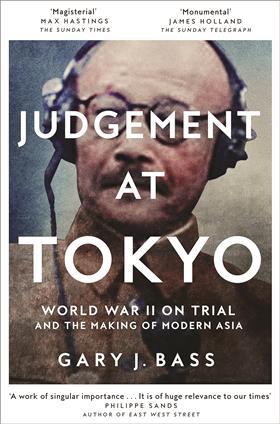
Judgement at Tokyo: World War II on Trial and the Making of Modern Asia
Gary J. Bass
£12.99, Picador, now in paperback
Touted by judges as the ‘biggest trial of the world’, Tokyo was the locus for the indictment of 28 senior Japanese leaders. With 4,335 pieces of evidence and a court transcript of 49,858 pages, prosecutors and judges from 11 different Allied countries addressed the Pacific war where ‘the question of war crimes was fundamental’. The indictment of those men comprised ‘an overwhelming set of charges of aggression and atrocity across Asia’.
However, as Gary J. Bass observes in his magnificent, readable study, the aspiration of the two-and-a-half-year trial to deliver a ‘truthful, unassailable historical account’ was stymied by ‘one of the grandest efforts at evidence-tempering in legal history’. Fearing an Allied ground invasion, foreign ministry officials consigned secret documents to the bonfire. Bereft of such incriminating orders, prosecutors would have to build a case around command responsibility – essentially, the accused leaders had known about the war crimes and had the authority to stop them. As Bass explains, ‘instead of having to prove an individual’s specific involvement with a specific crime, the prosecutors only had to demonstrate that they were part of the conspiracy’.
While eclipsed by the better-known war crimes tribunal at Nuremberg, Bass considers how some elements of Tokyo were analogous to the trial of Nazi leaders. In focusing on the Nanjing massacre, the treatment of British and Australian prisoners of war in Thailand and Burma, the Bataan death march, the sack of Manila and the attack on Pearl Harbour, ‘like Nuremberg [Tokyo] made a revolutionary attempt to enshrine aggressive war as the cardinal international crime’. Prosecutors set out charges of crimes against peace, war crimes, and crimes against humanity, though later judges elided several of the original 55 counts. The crime of aggression so overshadowed the trial that Australian chief judge Sir William Webb alluded to conventional war crimes and crimes against humanity only on the sixth of the seven days it took him to read the judgment.
Bass is even-handed. Defence counsel at Tokyo contended that this was a conflict of self-defence, rooted in the encirclement of Japan by American, British, Dutch, Chinese and Filipino foes, and the desire for war materials. Turning to the atomic bombings of Hiroshima and Nagasaki and the aerial bombardment of Japanese cities, Bass notes that the ‘victorious powers made little effort to scrutinise their own wartime conduct’. Embodied in international law was ‘the illegality of killing innocent civilians or abusing prisoners of war’, yet aerial bombardment was not outlawed. The indictment eschewed Japan’s ‘indiscriminate bombing of Chinese cities’.
The travails of empire – stoked by anticolonial nationalism in, for example, India, Indonesia and Vietnam, and Communist revolutionary victories in China – are motifs throughout this book. Bass suggests that in such a ‘divided, seething Asia’, it was naive to think that legal apparatus alone could outlaw aggressive war.
Indian judge Radhabinod Pal’s dissenting opinion said that Allied judges might have a ‘bias created by racial or political factors’. And as Bass stresses, ‘for many Japanese nationalists, the Tokyo trial is still seen as just another sanctimonious, hypocritical chapter in the molding of a white man’s world’.
Underpinned by more than 150 pages of ‘notes’ and with documentary evidence drawn from 18 archives in seven nations, this is an enthralling scholarly work.
Nicholas Goodman is a sub-editor at the Law Society Gazette































No comments yet